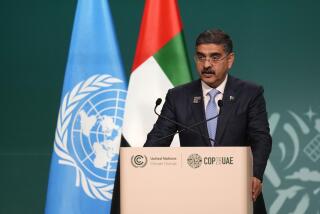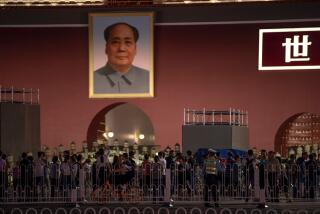Afghan power symbols struck
KABUL, AFGHANISTAN — The brazen and well-coordinated attacks by insurgents against four embassies and other key sites in the heart of Afghanistan’s capital were aimed less at inflicting high numbers of casualties, analysts said, than at humiliating the government and its foreign allies as Afghan forces take increasing responsibility for protecting their own homeland.
Taking positions on high-rise construction sites, attackers on Sunday rained down rocket-propelled grenades, bullets and fear on Kabul, targeting major symbols of Afghan and foreign power, including the U.S., British, German and Russian embassies and NATO headquarters. Other teams of militants struck airfields and police stations in three eastern provinces and attempted to assassinate one of the country’s two vice presidents.
About 20 insurgents were killed in the attacks, which injured at least 15 police officers and nine civilians, government officials said. The Taliban took responsibility for the day’s mayhem, calling it part of a spring offensive, though its claim could not be verified.
Though aimed at a wider range of targets, the attacks were reminiscent of a daylong militant assault in September on the U.S. Embassy and NATO headquarters, with insurgents once again sending the message that they could strike at will. The militants also showed the limits of allied and Afghan intelligence by infiltrating neighborhoods dotted with spies, checkpoints and protective defenses.
“Knowing that foreigners lack the will to remain in Afghanistan, their intent is to show that Afghan forces are unable to effectively fight the Taliban after the foreign withdrawal,” said Rohan Gunaratna, head of the International Center for Political Violence and Terrorism Research at Singapore’s Nanyang Technological University. “The Taliban’s operating here at both physical and psychological levels.”
The dramatic assault, analysts said, was also meant to signal to ordinary Afghans that they should align with the Taliban or risk ending up on the losing side when foreign troops complete their withdrawal, scheduled for 2014.
In addition, the assault could serve to undermine the peace process initiated by Washington by strengthening the hand of Taliban hard-liners; put greater pressure on allies that are increasingly weary of the war’s cost in money and lost lives; and feed the impression that the eventual exodus of Western troops will be a defeat, not an honorable and voluntary departure.
“We’re only going to see an increase in these attacks,” said Dipankar Banerjee, founding director of New Delhi’s Institute of Peace and Conflict Studies, a think tank. “It helps [the militants] ensure political dominance in the new order as they slowly take over.”
Afghan and U.S. officials offered a different perspective on Sunday’s events, arguing that they showed Afghan forces were increasingly able to take over security from their North Atlantic Treaty Organization counterparts, having met and beat back attacks in three parts of the city largely without the alliance’s help.
The capability of Afghan forces in fighting insurgents was “proven today by their professional and highly effective response in restoring order,” said a statement from the U.S. Embassy, which was in lockdown status during the attacks and could account for all personnel.
The praise of Afghan forces was echoed by Afghanistan’s Interior Ministry and Gen. John Allen, commander of NATO’s International Security Assistance Force, who said in a statement that the resolute Afghan response showed that the country’s sovereignty and legitimate governance were not in peril.
The attacks were launched shortly after noon with a series of explosions in the Wazir Akbar Khan neighborhood, which houses diplomatic missions and NATO headquarters. Other insurgent teams fanned out, targeting parliament from the upper floors of a nearby building and attempting unsuccessfully to assassinate Vice President Mohammad Karim Khalili.
The attacks spread fear throughout Kabul.
“I am on the top roof of parliament building,” said Mohammad Nahem Lalai Hameedzai, a lawmaker from southern Kandahar, by telephone. “The attack on parliament is an attack on Afghanistan and all its people.”
Afghanistan’s Information Ministry said a minivan filled with explosives along Parliament Road was intercepted and defused by Afghan security forces. Another team of attackers entered a building near the British Training Center, it said, mounting an attack from there.
In a further flexing of their muscles, the attackers also struck airfields, police headquarters and reconstruction facilities in eastern Nangarhar, Lowgar and Paktia provinces.
Two insurgents captured by authorities reportedly said they were with the Haqqani network, a group based out of North Waziristan in neighboring Pakistan’s tribal areas that is distinct from but sometimes cooperates with the Taliban.
In an interview Sunday with CNN’s Candy Crowley, U.S. Ambassador to Afghanistan Ryan Crocker had his own reason for doubting the Taliban’s claim of responsibility. “Frankly, I don’t think the Taliban is good enough” to pull off such an attack, he said.
The Taliban has claimed responsibility for attacks in the past it didn’t commit as part of its propaganda war. If it turns out the assaults were carried out by the Pakistan-based Haqqani network, it could further strain relations between the United States and Pakistan.
Republican Sen. John McCain, meanwhile, said Sunday’s attacks reflected the risk of the drive to reduce the U.S. military presence in Afghanistan.
“Every time the president announced another withdrawal, his military commander said it increases the risk,” he told CBS’ Bob Schieffer. “That’s what we’re seeing here.”
--
Special correspondent Yaqubi reported from Kabul and Times staff writer Magnier from New Delhi. Staff writer Matea Gold in Washington contributed to this report.
More to Read
Sign up for Essential California
The most important California stories and recommendations in your inbox every morning.
You may occasionally receive promotional content from the Los Angeles Times.










